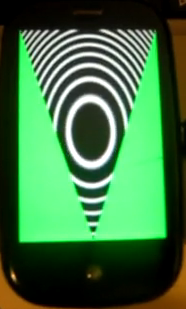Difference between revisions of "OpenGL Triangle of Doom"
Jump to navigation
Jump to search
Rboatright (talk | contribs) (switch to sb2) |
m |
||
| (8 intermediate revisions by 4 users not shown) | |||
| Line 1: | Line 1: | ||
| + | [[Category:SDL]] | ||
| + | |||
== The demo app == | == The demo app == | ||
[[Image:Opengldemo.png|160px|left]]This app is loosely based on a [http://wiki.maemo.org/SimpleGL_Example an OpenGL example from the maemo project] and is ported from X11 OpenGL code to SDL to function in webos | [[Image:Opengldemo.png|160px|left]]This app is loosely based on a [http://wiki.maemo.org/SimpleGL_Example an OpenGL example from the maemo project] and is ported from X11 OpenGL code to SDL to function in webos | ||
| − | + | First, follow the tutorial [[WebOS Internals PDK]] to set up the cross compilation environment. | |
| + | |||
| + | Next, copy the source below into a file doomtriangle.c | ||
| + | |||
| + | Now run scratchbox2 with the webos / pre mapping file: | ||
| + | $ sb2 -M /srv/preware/cross-compile/staging/mapping-armv7 | ||
| + | |||
| + | You will get a different prompt indicating you are in a scratchbox shell, like: | ||
| + | [SB2 mapping-armv7 armv7] $ | ||
| + | |||
| + | Now just | ||
| − | |||
<pre> | <pre> | ||
| − | gcc | + | export LIBS="-Wl,-rpath-link=/usr/local/lib -L/usr/local/lib" |
| + | gcc -I/usr/local/include/SDL $LIBS -o doomtriangle doomtriangle.c -lSDL -lGLESv2 | ||
</pre> | </pre> | ||
| − | + | Now, copy the resulting binary doomtriangle to your pre and run it. | |
| − | + | ||
| − | + | ||
| − | |||
| − | doomtriangle.c | + | ===doomtriangle.c=== |
| Line 38: | Line 49: | ||
glGetShaderiv(shader, GL_INFO_LOG_LENGTH, &length); | glGetShaderiv(shader, GL_INFO_LOG_LENGTH, &length); | ||
if(length) { | if(length) { | ||
| − | char* buffer = | + | char* buffer = malloc( sizeof(char) * length ) ; |
glGetShaderInfoLog(shader, length, NULL, buffer); | glGetShaderInfoLog(shader, length, NULL, buffer); | ||
printf("%s", buffer); | printf("%s", buffer); | ||
Latest revision as of 16:45, 26 June 2010
The demo app
This app is loosely based on a an OpenGL example from the maemo project and is ported from X11 OpenGL code to SDL to function in webos
First, follow the tutorial WebOS Internals PDK to set up the cross compilation environment.
Next, copy the source below into a file doomtriangle.c
Now run scratchbox2 with the webos / pre mapping file:
$ sb2 -M /srv/preware/cross-compile/staging/mapping-armv7
You will get a different prompt indicating you are in a scratchbox shell, like:
[SB2 mapping-armv7 armv7] $
Now just
export LIBS="-Wl,-rpath-link=/usr/local/lib -L/usr/local/lib" gcc -I/usr/local/include/SDL $LIBS -o doomtriangle doomtriangle.c -lSDL -lGLESv2
Now, copy the resulting binary doomtriangle to your pre and run it.
doomtriangle.c
#include <stdio.h>
#include <stdlib.h>
#include "SDL.h"
#include "SDL_opengles.h"
#include "SDL_video.h"
#include <math.h>
#include <sys/time.h>
#include <unistd.h>
#include <string.h>
const char* vertexSrc = "attribute vec4 position; varying mediump vec2 pos; void main() { gl_Position = position; pos = position.xy; }";
const char* fragmentSrc = "varying mediump vec2 pos; uniform mediump float phase; void main() { gl_FragColor = vec4(1, 1, 1, 1) * sin((pos.x * pos.x + pos.y * pos.y) * 40.0 + phase); }";
//const char* fragmentSrc = "varying mediump vec2 pos; uniform mediump float phase; void main() { gl_FragColor = vec4(1, 1, 1, 1) * step(pos.x * pos.x + pos.y * pos.y, phase * 0.2); }";
void printShaderInfoLog(GLuint shader) {
GLint length;
glGetShaderiv(shader, GL_INFO_LOG_LENGTH, &length);
if(length) {
char* buffer = malloc( sizeof(char) * length ) ;
glGetShaderInfoLog(shader, length, NULL, buffer);
printf("%s", buffer);
free( buffer ) ;
GLint success;
glGetShaderiv(shader, GL_COMPILE_STATUS, &success);
if(success != GL_TRUE) {
exit(1);
}
}
}
GLuint createShader(GLenum type, const char* pSource) {
GLuint shader = glCreateShader(type);
glShaderSource(shader, 1, &pSource, NULL);
glCompileShader(shader);
printShaderInfoLog(shader);
return shader;
}
int phaseLocation ;
const float vertexArray[] = {
0, -1, 0, 1,
1, 1, 0, 1,
-1, 1, 0, 1
};
#define false 0
#define true 1
#define bool int
void render() {
static float offset = 0;
glViewport(0, 0, 320, 480 ) ;
glClearColor(0, 1, 0, 1);
glClear(GL_COLOR_BUFFER_BIT);
glUniform1f(phaseLocation, offset);
glVertexAttribPointer(0, 4, GL_FLOAT, false, 0, vertexArray);
glEnableVertexAttribArray(0);
glDrawArrays(GL_TRIANGLE_STRIP, 0, 3);
SDL_GL_SwapBuffers( ) ;
offset = fmodf(offset + 0.2, 2*3.141f);
}
int main() {
if( SDL_Init( SDL_INIT_VIDEO ) < 0 ) {
fprintf( stderr, "Couldn't initialize SDL: %s\n", SDL_GetError() ) ;
exit( 1 ) ;
}
if ( SDL_SetVideoMode( 320, 480, 32, SDL_OPENGLES ) == NULL ) {
fprintf(stderr, "Couldn't set GL mode: %s\n", SDL_GetError());
SDL_Quit();
exit(1);
}
printf("Screen BPP: %d\n", SDL_GetVideoSurface()->format->BitsPerPixel);
printf("\n");
printf( "Vendor : %s\n", glGetString( GL_VENDOR ) );
printf( "Renderer : %s\n", glGetString( GL_RENDERER ) );
printf( "Version : %s\n", glGetString( GL_VERSION ) );
printf( "Extensions : %s\n", glGetString( GL_EXTENSIONS ) );
printf("\n");
GLuint shaderProgram = glCreateProgram();
GLuint vertexShader = createShader(GL_VERTEX_SHADER, vertexSrc);
GLuint fragmentShader = createShader(GL_FRAGMENT_SHADER, fragmentSrc);
glAttachShader(shaderProgram, vertexShader);
glAttachShader(shaderProgram, fragmentShader);
glLinkProgram(shaderProgram);
glUseProgram(shaderProgram);
phaseLocation = glGetUniformLocation(shaderProgram, "phase");
if(phaseLocation < 0) {
printf("Unable to get uniform location\n");
return 1;
}
bool quit = false;
//timeval startTime;
//timezone tz;
//gettimeofday(&startTime, &tz);
int numFrames = 0;
while(!quit) {
SDL_Event event ;
while( SDL_PollEvent( &event ) ) {
if( event.type == SDL_KEYDOWN && event.key.keysym.sym == SDLK_ESCAPE ) quit = 1 ;
}
render();
numFrames++;
if(numFrames % 100 == 0) {
//timeval now;
//gettimeofday(&now, &tz);
//float delta = now.tv_sec - startTime.tv_sec + (now.tv_usec - startTime.tv_usec) * 0.000001f;
//printf("fps: %f\n", numFrames / delta);
}
}
return 0;
}
